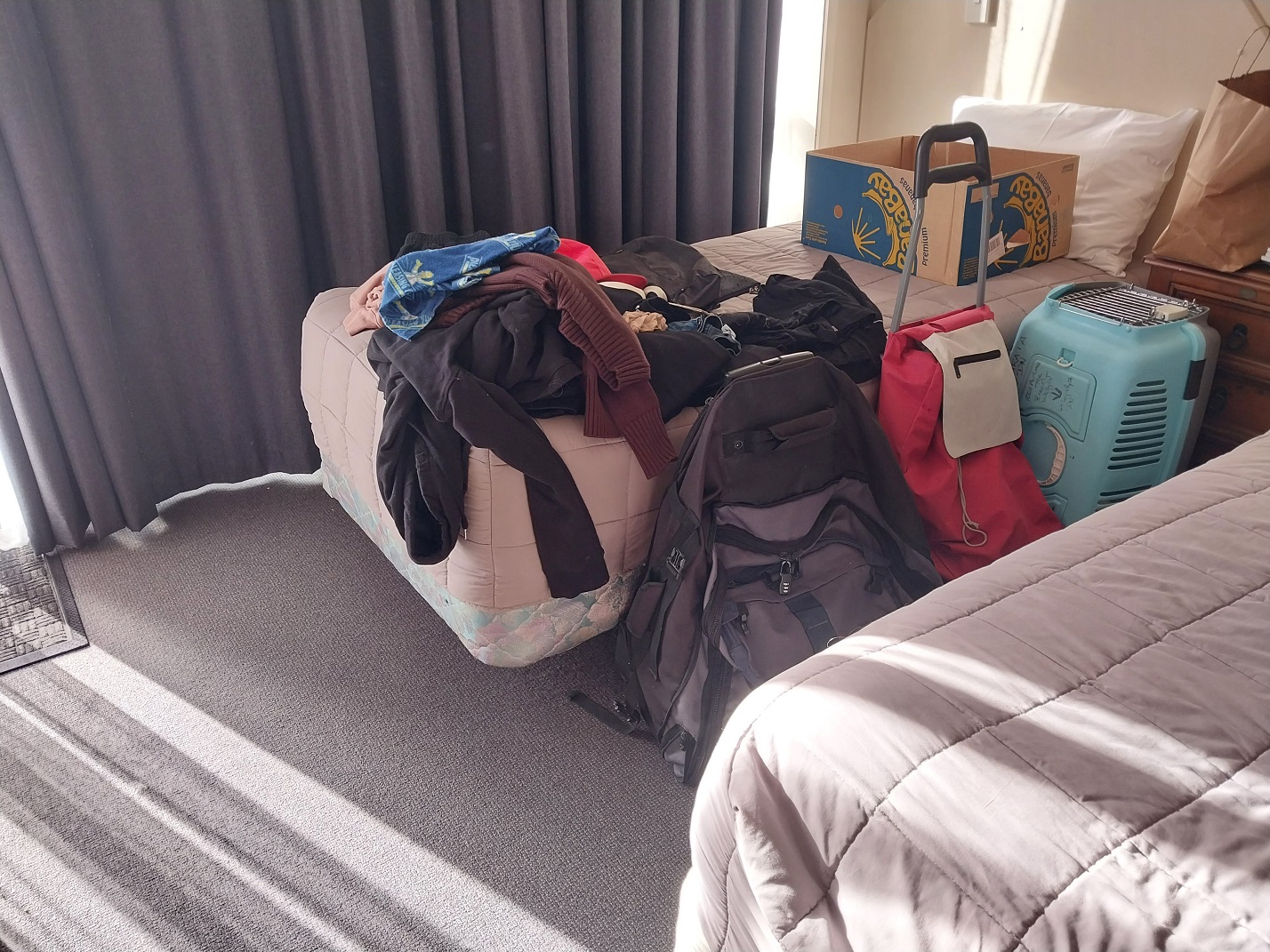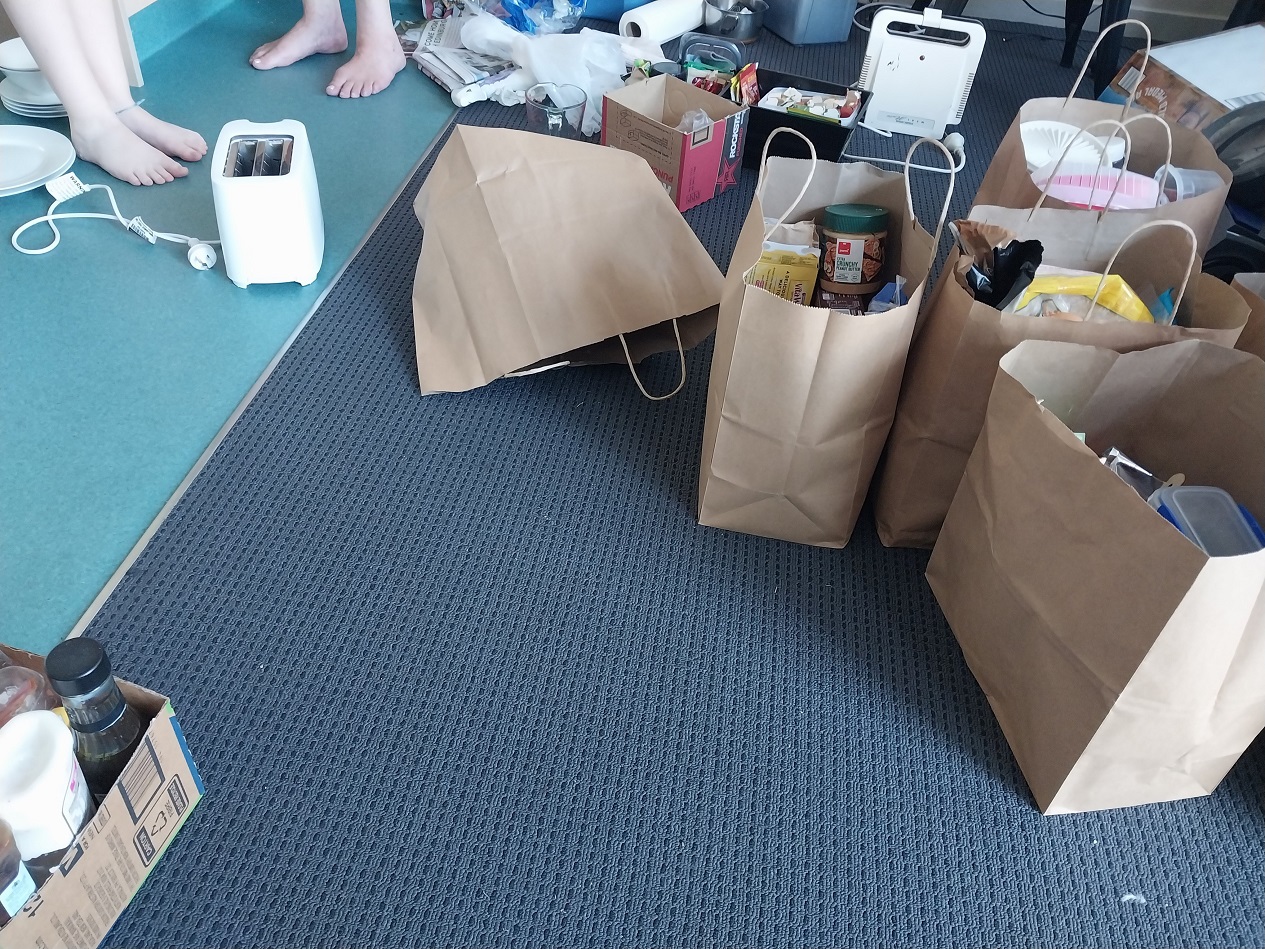
To the casual eye, a motel on a Dunedin main street looks like any other, with anonymous doors facing parking lots. It’s not. Its owner is being paid to house homeless people.
The government-funded scheme contracts the charity Emerge Aotearoa to secure homeless people’s stays at the motel and also provide support workers, helping homeless people to move on to proper housing.
However, there are major hurdles, including intense competition for homes. There are too few private rentals and long waiting lists for state homes.
Some of the homeless people in the motel, and in other buildings used by the charity, also question the charity’s help. Two families spoken to have been issued with eviction notices by Emerge.
Here are some of their stories.
Doreen’s story
Doreen* is in her 70s, homeless and suffers from complex post-traumatic stress disorder and a recent hip replacement. She has a dim view of the government’s transitional housing scheme and the charities funded to run it.
Sitting on a bed in a motel room, she says it is a "government cop-out" that doesn’t work.
It’s a dingy space with one bed for her and another strewn with belongings. There is a mini-kitchen in the same room and a small shower room at the back. There is a communal laundry elsewhere.
"Transitional" suggests she is on her way to somewhere better. The charity Emerge has assigned her a "housing navigator" who is meant to help get her there. But Doreen feels she is going nowhere. She has been here since before Christmas, says she has not been offered a home that is suitable, and has considered suicide on multiple occasions.
The motel is designed for low-budget short stays by travellers. It is not state housing designed to meet vulnerable people’s needs. Doreen says she struggles to get on and off the low toilet and the tiny counter-top oven is broken.
She says she feels "marginalised by the system and stigmatised here — from the cleaners up to the motel owner. He seems to just have dollar signs in his eyes and treats me with contempt. People don’t know what it is like."
There are rules, stuck to room walls, including no visitors after 7pm. Doreen and other homeless people living here describe the place as an open prison.
The rules are set by the motel’s management — but failure to comply can mean an eviction notice served by a different organisation. Transitional housing is a complex arrangement between government, charities and motel and other accommodation providers.
The Ministry of Housing and Urban Development (HUD) runs the scheme but contracts charities, including Emerge, to deliver it. The charities find a place for a homeless person or family to stay and get them to sign a "housing agreement".
These agreements, often for three-month terms that are then renewed, are exempt from government rules under the Residential Tenancies Act that protect tenants from unfair eviction, making it easier in theory for charities to turf out transitional housing tenants.
HUD has guidelines that stipulate that organisations providing transitional housing must work with the family to devise a "transition plan" that leads to "longer-term housing", rather than ending a transitional housing agreement through eviction or something unsuitable and a slide back into homelessness.
Doreen’s Emerge housing navigator sends her web links to homes in the city that are available to rent and encourages her to go and see them. Emerge workers also offer to help with transport to house viewings and references for prospective landlords. However, the charity can’t address the fact that there are too few social homes and there is intense competition for private rentals that makes it hard to impossible for homeless people to secure one.
There are 103 beds available for transitional stays at this motel and in other locations, with 45 of these provided through Emerge. By contrast there are 642 people in 426 families waiting for a Kainga Ora home, according to the Ministry of Social Development. More people are on a waiting list for a council-run public home — largely for older people — although there is some overlap between the lists.
At viewings of private rentals, Doreen points out that "there might be 40 or 50 other people."
When contacted by the ODT about the charity’s effectiveness at housing the homeless, Emerge’s chief executive John Cook referenced the high number of people on Dunedin’s public housing register "and a constrained private rental market".

It’s not easy. Principal of a leading Dunedin rental agency, Darling Realty, Lincoln Darling confirms how hard this could be, particularly for a homeless person with complex life challenges.
Due to a shortage of rentals, landlords "can take their pick", he says. Agents have a "duty of care to the landlords to get the best tenants for the property."
Mr Darling mentions a boarding house, where he says homeless people can choose to live, who find it hard to compete for a private rental.
Doreen says she knows the place and would avoid it like the plague.
"I cringe when I imagine what it would be like living there."
It’s bad enough at the motel, she says. One of the problems is noise. Nearby student flats blare out music but there are also regular incidents of shouting by motel residents who are in the transitional housing scheme.
Doreen says "it usually isn’t anger. It is anxiety caused by their current situation."
Cathy’s story
The ODT met Cathy first in early February, living with her teenage daughter in the same motel as Doreen, under a transitional housing contract with Emerge. They had been there since December last year.
Cathy has a medical condition that causes her pain plus a history of mental illness, suicide attempts and self-harm.
She estimated she had looked at more than 100 rental properties since April 2023, when they first became homeless, but not had any offers.
"I thought Emerge was here to help me and that landlords would be pleased to have a guaranteed rental from my benefits and I have good references — but it is a waste of time. I am not getting a house because I am on benefits and have a dog."
Cathy admitted to causing noise on three, brief, occasions while at the motel. A visiting close friend describes it as "just part of her mental illness and venting her frustration. I understand it". On one occasion, Cathy had screamed due to pain from a medical emergency.
There were repercussions.
Cathy had a letter pushed through her window on 20 December warning she had breached rules. She had "disturbed the peace" and a guest had been observed leaving at 8pm.
"I almost didn’t see it because it was under the curtains. I was shocked, explained my behaviour and apologised."
She was then visited by Emerge staff on 9 February and told she was being evicted for "anti-social behaviour" — with only one day’s notice and nowhere to go.
An eviction letter was handed over that said that Emerge had "informed MSD we will no longer be working with you". It told her to get in touch with MSD. It wished her "all the best going forward".
The letter also reminded Cathy that Emerge was exempt from the rules giving tenants rights. An Emerge worker, in the visit, stressed that it can be difficult for homeless people to find a home. "There is plenty of discrimination out there".
Cathy says that she felt "overwhelmed. I couldn’t believe it. I didn’t understand. Of course I cried and burst into tears. It was horrible. It was intense."
Cathy made a complaint. Her daughter and her were subsequently allowed to stay on at the motel for three more nights, and Emerge moved them into a block of small motel-style apartments in a different suburb, with poor sound insulation.

On a later visit by the ODT, Cathy said she had tried to kill herself again. She pointed to stresses in her life, including isolation and not having a home.
She had been prescribed medication to keep her calm. She had thought about leaving Dunedin, but is staying, for now, for the sake of her daughter’s education.
She had received a letter from Emerge saying her complaint had been upheld. The letter admits Cathy had been given "confusing" information about the breach and eviction and this had understandably caused Cathy to be "unsure" about continuation Emerge’s help.
Emerge said its "service letters" to clients in transitional housing would be reviewed and changes would be made.
Cathy said it didn’t make things "OK". She needs a home. "They ask us ‘how it is going, have we found a house?’ But what are they doing to help us?"
She has now been told by an Emerge "housing navigator" that the chance of a social home is a "waiting game" and her contract in transitional housing will, in the meantime, be extended.
Emerge boss Mr Cook says the charity is "acutely aware of the broad range of reasons that lead to whanau being in housing distress ... We believe housing is a human right and stable accommodation a bedrock of wellbeing."
The slogan of Emerge is "strengthening whanau together, so that communities can thrive."
Cathy says: "What strengthening? What community?"
Family of former refugees still homeless
A family of former refugees, with seven children and limited English, are still stuck in their Emerge-run transitional house that they have been living in for two years while they hope for a social home, after the ODT reported on their plight two months ago.
The family is categorised on the Kainga Ora waiting list as having a serious need for a four bedroom, or larger, public home. There are 70 Kainga Ora four-bedroom houses in Dunedin and three five-bedroom houses, but none yet available to move into.
A Kainga Ora spokesperson says a few more houses are soon to be released — 3 this year and 10 next year — plus one more five-bedroom house next year.
They are needed. There are 12 families on the MSD-run waiting list for these larger homes. The decision to release a state house to a specific family is made by Kāinga Ora but based on MSD's prioritisation of families on the waiting list.
The mother says she is ill, stressed, has tried to get a private rental and not succeeded and urgently needs a state home for permanent stability. "Why are they making us suffer so long? We are heartbroken and tired. It is like a horror movie."
The dad has been living separately, since Emerge alleged, earlier this year, that he had engaged in "aggressive" behaviour towards their staff in a meeting. Witness statements and a recording of the meeting obtained by the ODT did not evidence Emerge’s claims.
However, MSD withdrew his eligibility to its emergency housing scheme — which provides funding for seven-night stays — on the basis of the allegation and Emerge issued the whole family with an eviction notice.
The family complained and there was a mediation run by the HUD-contracted dispute resolution service Fair Way.
Emerge boss Mr Cook said the outcome of the mediation was confidential but the charity continued to "provide support to the [family] and encourage them to explore all housing options".
When asked, Mr Cook did not provide information about numbers of homeless people who had received Emerge’s Dunedin transitional housing scheme, nor outcomes for them.
Friend of the family Richard Miller says: "Underneath all of this is a systemic failure to provide enough state homes for vulnerable people who have suffered terrible traumas. A home is a fundamental foundation for all of us."
*All names of the homeless have been changed to protect identities.











